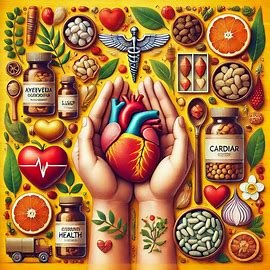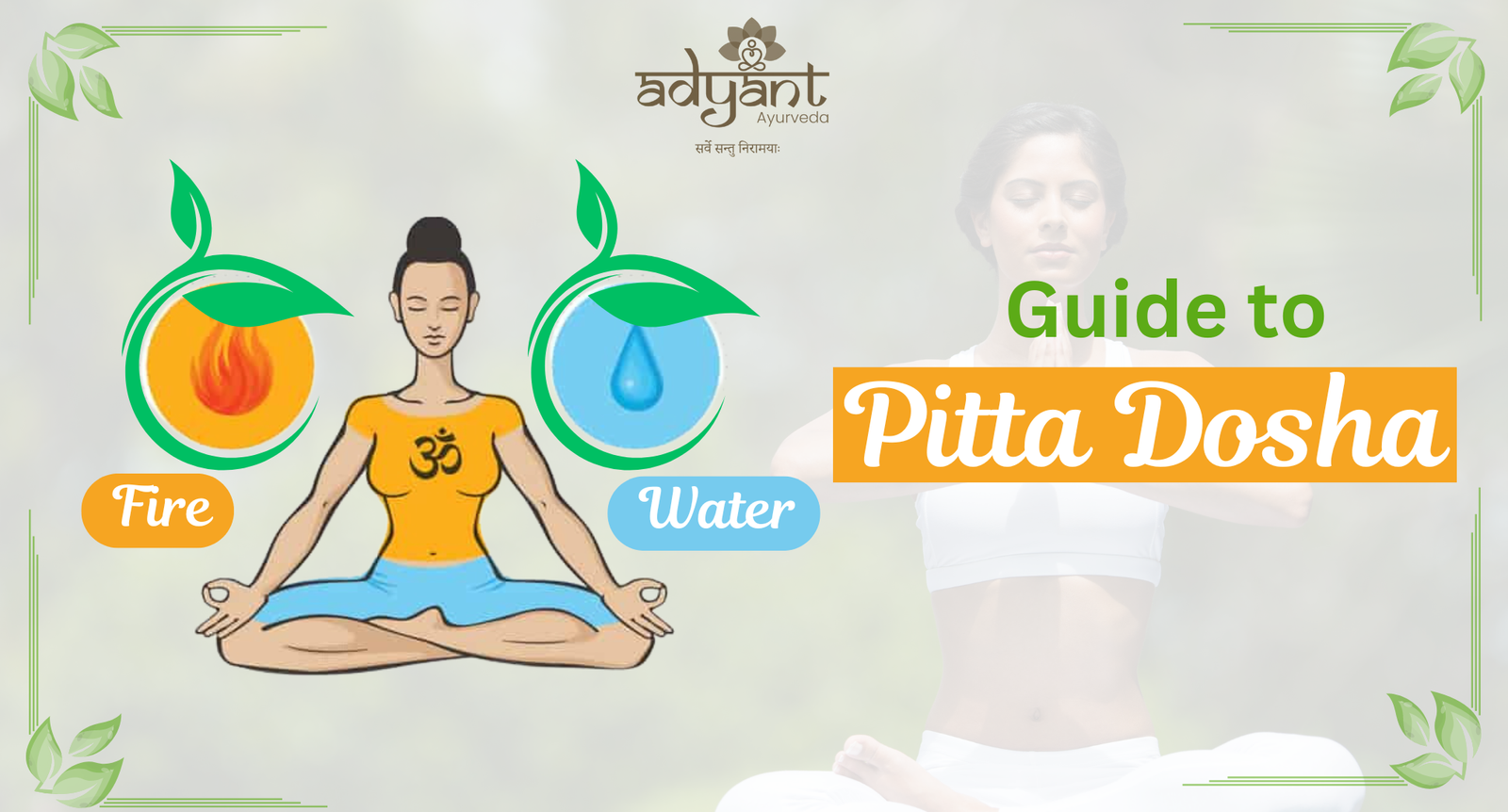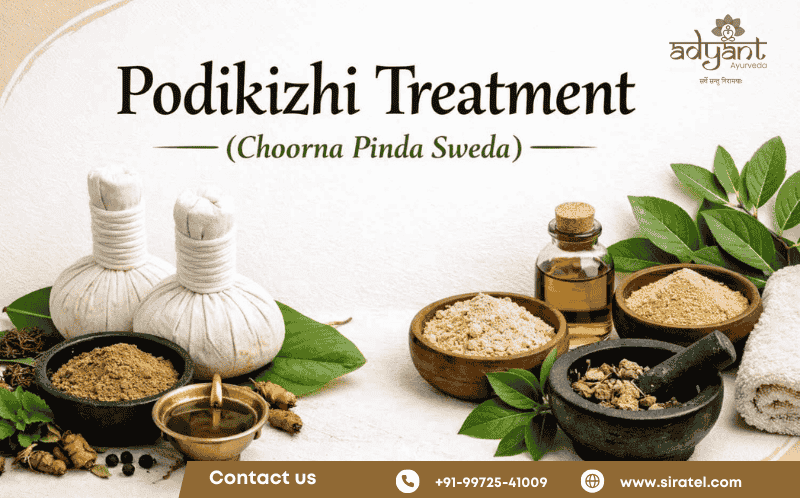Table of Contents
ToggleAt Adyant Ayurveda, we are dedicated to offering holistic heart care through traditional Ayurvedic principles integrated with modern science. Our expert doctors, with over 24 years of experience, focus on providing personalized treatments that balance the body’s energies, support heart health, and prevent cardiac conditions. Ayurveda not only addresses physical symptoms but also emotional and spiritual well-being.
Understanding Heart Health from an Ayurvedic Perspective
Ayurveda views the heart (Hridaya) as the core of human existence, responsible for circulation, vitality, emotions, and mental clarity.
The Three Doshas and Their Impact on Heart Health
Vata Dosha: Governs movement; imbalance leads to arrhythmias and irregular heart rhythms.
Pitta Dosha: Controls metabolism; imbalance causes inflammation, hypertension, and coronary artery disease.
Kapha Dosha: Maintains structure; excess Kapha results in blockages and cholesterol-related issues.
Ayurveda provides natural solutions for modern heart issues such as hypertension, coronary artery disease, and arrhythmias through herbs, Panchakarma therapies, and lifestyle guidance.
Ayurvedic Understanding of the Heart
Heart as the Seat of Consciousness (Hridaya): The center of mind-body-emotional connection.
Concept of Ojas and Heart Health: Source of immunity and vitality; essential for disease resilience.
Relationship Between Mind and Heart: Mental stress impacts cardiac function.
Role of Agni (Digestive Fire): Weak digestion leads to toxin buildup (Ama), contributing to heart disease.
Common Cardiac Conditions and Ayurvedic Perspectives
| Modern Disease | Ayurvedic Diagnosis | Primary Dosha |
|---|---|---|
| Hypertension | Raktagata Vata | Vata–Pitta |
| Coronary Artery Disease (CAD) | Hridroga / Amasanchaya | Kapha–Pitta |
| Valvular Disease | Hridgraha / Hrudayavishuddhi | Tridosha |
| Heart Failure | Daurbalya of Ojas + Mandagni | Tridosha |
A. Hypertension (Raktagata Vata)
Treatment: Vata balancing herbs, stress management, improved circulation.
B. Coronary Artery Disease
Treatment: Detoxification, anti-ama diet, Arjuna, Guggulu, Triphala.
C. Arrhythmias
Treatment: Pushkarmool, Vata pacifying Panchakarma, nervine tonics.
D. Heart Failure
Treatment: Rasayana, Ojas-enhancing herbs, digestive fire correction.
Clinical Success Stories from Ayurvedic Cardiac Care
Mitral Valve Disease Reversed: A 40-year-old woman increased her mitral valve area from 1.3 cm² to 3.52 cm² using Deepana, Pachana, Rasayana, and Punarnava Baladi Ksheerapaka.
Triple Vessel Blockage Stabilized: A 57-year-old man reduced 90% LAD blockage to 60–65% using a low-carb diet and Panchakarma over 24 months.
Heart Revival Clinical Trial: Polyherbal formulation lowered BP, LDL, and cholesterol in 8 weeks (45-patient trial).
🧠 Hridgraha & Hridayavishuddhi Explained
Hridgraha: Impaired function of the heart due to chronic Ama.
Hridayavishuddhi: Congested heart space leading to dyspnea and fatigue.
Treatment: Deepana-Pachana, Langhana, Rasayana.
💫 Srotoshodhana (Channel Clearance) in Cardiovascular Wellness
Blocked Srotas: Result in arterial congestion and sluggish blood flow.
Therapies: Triphala Guggulu, Arogyavardhini Vati, Takrapana, Swedana.
🗕️ Long-Term Follow-Up & Monitoring Protocol
Periodic Nadi Pariksha
ECHO/3DCCG every 3 months
Lab markers: CRP, ESR, Lipid Profile
Diet, Panchakarma, and Rasayana adjustments
🧘♂️ Mental Wellness & Sattvavajaya Chikitsa
Mantra Chikitsa (Sound healing)
Meditation, mindfulness
Herbs: Brahmi, Shankhapushpi, Jatamansi
☸️ Seasonal (Ritucharya) Adjustments for Heart Health
Winter: Warm oils, Abhyanga
Summer: Cooling drinks, light diet
Rainy: Reduce salt/oil, favor ginger, and light meals
⚖️ Ayurveda vs Modern Cardiology Table
| Parameter | Ayurveda | Modern Cardiology |
| Focus | Dosha & Ama balance | Symptom suppression |
| Diagnostics | Nadi Pariksha, Mala, Jihva | ECG, ECHO, Angiography |
| Therapies | Herbal, Panchakarma, Rasayana | Stents, surgery, medications |
| Outcome | Rejuvenation, prevention | Dependency on intervention |
| Safety | Natural, minimal side effects | Long-term side effects |
🪠 Post-Viral Cardiac Recovery Support
Herbs: Ashwagandha, Guduchi, Shatavari
Therapies: Takradhara + Brahmi Ghrita
Support: Punarnava, Gokshura for cardiac edema
Approach: Langhana, Rasayana
🖔 Advanced Ayurvedic Formulations Used at Adyant Ayurveda
Heerak Bhasma: Cellular rejuvenation, valvular repair
Hridayarnava Rasa, Chintamani Ras, Cardinox: Cardiac output regulation
Punarnava Baladi Ksheerapaka: Strengthens the heart
Partharishtam, Dashamoolarishtam, Roheetakarishtam: Circulatory tonics
Dhanwantharam Taila (Pichu): Improves circulation
🪷 Ayurvedic Treatments and Therapies for Heart Health
A. Herbal Remedies for Heart Health
| Herb | Key Benefits |
| Arjuna | Strengthens the heart muscle, supports the heart rhythm |
| Guggulu | Reduces cholesterol and plaque |
| Pushkarmool | Helps in arrhythmias and breathlessness |
| Brahmi/Shankhapushpi | Calms the mind, lowers stress-linked BP |
| Sarpagandha | Controls hypertension |
| Vacha | Enhances mental clarity, clears oxidative stress |
B. Panchakarma Procedures
Hrid Basti: Retention of medicated oils over the heart region to nourish and strengthen the cardiac muscles.
Snehan (Oleation): Internal and external application of oils to mobilize toxins.
Sweden (Fomentation): Induces sweating to dilate channels and aid toxin elimination.
Takradhara: Continuous pouring of medicated buttermilk on the forehead, ideal for hypertension and nervous exhaustion.
Shirodhara with Madhuyashti: Helps in reducing anxiety-induced BP and calms the nervous system.
Basti (Medicated Enema): Detoxifies the colon, crucial for managing Vata-related cardiac issues.
C. Dietary Interventions
| Dosha Type | Recommended Foods | Foods to Avoid |
| Vata | Warm, oily, nourishing – ghee, soups | Cold, dry, raw foods |
| Pitta | Cooling, hydrating – coconut, cucumber | Spicy, sour, fermented foods |
| Kapha | Light, dry, warming – barley, ginger | Fried, heavy, oily foods |
D. Lifestyle Modifications (Dinacharya)
Daily Routine: Begin your day with oil pulling and Abhyanga (self-massage), follow a consistent meal schedule, and sleep early to support heart health.
Exercise: Practice yoga postures like Tadasana and Bhujangasana to improve circulation, along with daily Pranayama (breathwork) and brisk walking.
Stress Management: Include daily meditation, breathing exercises, and journaling practices to manage emotional well-being and lower blood pressure.
✨ Rasayana Therapy and Ojas Restoration
Post Panchakarma, Rasayana Chikitsa is administered to rebuild tissues, improve heart resilience, and enhance overall vitality.
Herbs: Ashwagandha, Shatavari, Amalaki, Brahma Rasayana
Indicated in: Heart failure, chronic fatigue, post-viral myocarditis
Why Choose Adyant Ayurveda for Heart Care?
Expert Doctors: Dr. Shree Lakshmi, Dr. Vidya, Dr. Sumana, Dr. Preethi
24+ Years of Experience in Ayurvedic cardiology
Integrated Approach: Personalized herbal protocols + Panchakarma + Modern diagnostics
Conclusion
Ayurveda offers a safe, effective, and long-term approach to cardiac health. By following a balanced diet, practicing yoga, and using Ayurvedic herbs, you can strengthen your heart naturally. Adyant Ayurveda in Bangalore provides expert care and customized treatments for a healthy heart and a stress-free life.
🌿 Take charge of your heart health today! Visit Adyant Ayurveda and book a free consultation now.
🌐 External References
- Arjuna in heart disease
- Panchakarma’s effect on cardiovascular health
- Ayurveda & hypertension
- Ayurveda & heart failure
FAQs on Ayurvedic Heart Treatment
Can Ayurveda reverse heart disease?
Ayurveda helps prevent and manage heart disease by detoxifying the body, improving circulation, and strengthening the heart.
How long does Ayurvedic treatment for heart health take?
3–6 months of consistent therapy and lifestyle changes show significant improvement.
Are Ayurvedic heart treatments safe?
Yes, Ayurveda uses natural herbs and therapies with no harmful side effects.
Can Ayurveda help lower cholesterol?
Yes, herbs like Arjuna, Guggulu, and Garlic help reduce bad cholesterol and improve heart function.
What is the role of Panchakarma in heart disease?
Panchakarma therapies like Hrid Basti, Basti, and Takradhara help detoxify the body, balance doshas, and strengthen heart function.
Is Ayurvedic treatment suitable for people with stents or previous surgeries?
Yes, Ayurvedic care can be safely integrated as supportive therapy post-surgery or with stents, under professional supervision.
Can Ayurveda manage high blood pressure (hypertension)?
Absolutely. Ayurvedic herbs like Sarpagandha, Vacha, and therapies like Shirodhara help regulate blood pressure naturally.
Does Ayurvedic treatment work for arrhythmias or irregular heartbeat?
Yes. Treatments target the Vata imbalance using herbs like Pushkarmool and therapies that calm the nervous system.
Will I need to stop my allopathic medicines if I start Ayurveda?
No. Ayurveda can complement allopathy. Over time, the dosage may be reduced if your doctor approves based on improved parameters.
Are there specific yoga asanas beneficial for heart patients?
Yes. Gentle yoga poses like Tadasana, Bhujangasana, and Pranayama like Anulom Vilom help improve heart function.
What are the signs of dosha imbalance affecting the heart?
Palpitations, breathlessness, fatigue, chest discomfort, or anxiety may indicate dosha imbalance affecting cardiac health.
Can Ayurveda prevent heart attacks?
While no system can guarantee prevention, Ayurveda strengthens the heart, manages stress, and addresses risk factors to significantly reduce the chances.
How does stress affect heart health in Ayurveda?
Ayurveda recognizes the mind-heart connection; chronic stress aggravates Vata and Pitta, weakening Ojas and harming heart function.
Are Ayurvedic treatments personalized?
Yes. At Adyant Ayurveda, treatment plans are based on your dosha constitution, medical history, and current imbalances.
Can I follow Ayurveda if I have diabetes along with heart disease?
Yes. Ayurveda addresses both conditions holistically through diet, herbs, and lifestyle changes that benefit metabolic and cardiac health.









